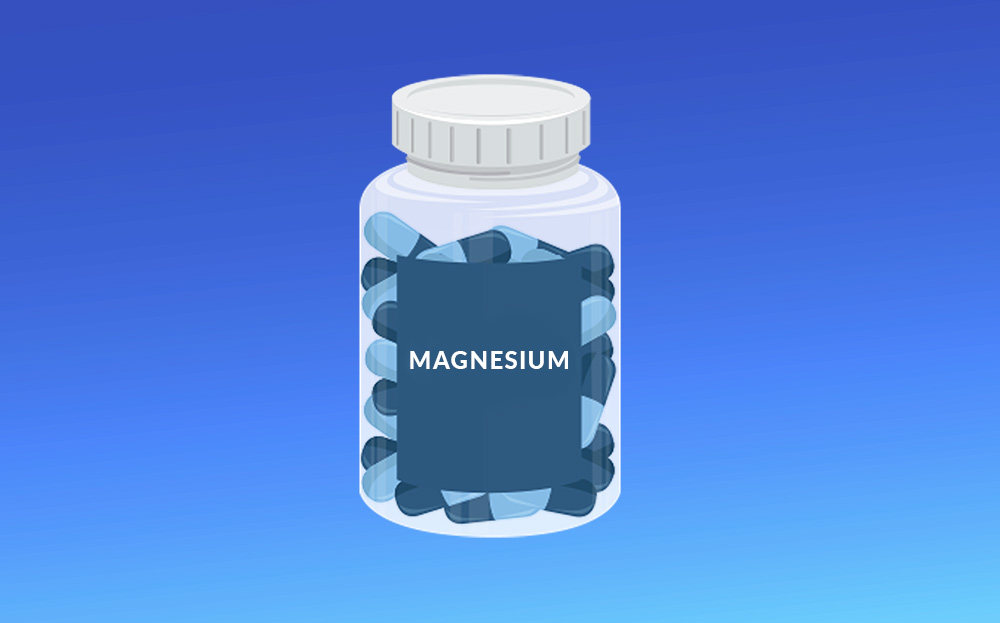Magnesium Glycinate vs. Magnesium Malate – Which One is Right for You?

Magnesium plays a crucial role in over 300 biochemical reactions in the body, supporting muscle function, nerve signaling, and energy production. Among the many forms available, magnesium glycinate and magnesium malate are widely used for their distinct benefits. While magnesium glycinate is often recommended for its calming effects and high bioavailability, magnesium malate is known for promoting energy metabolism and reducing muscle fatigue. Understanding the difference between magnesium glycinate and malate is essential for choosing the right form based on individual health goals.
Understanding Magnesium and Its Importance
Why Magnesium Matters for Health
Magnesium is an essential mineral involved in over 300 enzymatic processes within the body, making it crucial for muscle function, nerve signaling, energy production, and cardiovascular health. According to the National Institutes of Health (NIH), magnesium plays a key role in regulating blood pressure, supporting bone density, and maintaining normal heart rhythms. Without adequate magnesium levels, the body struggles to perform critical biochemical reactions, leading to a wide range of potential health issues.
A deficiency in magnesium can result in muscle cramps, fatigue, irregular heartbeats, and cognitive difficulties. Research published in the Journal of the American College of Nutrition highlights that many individuals, particularly those consuming a processed diet, fail to meet their daily magnesium needs. Common symptoms of inadequate magnesium intake include poor sleep quality, frequent headaches, heightened stress levels, and muscle weakness. Given its extensive physiological roles, maintaining optimal magnesium levels is essential for overall well-being.
Different Forms of Magnesium and Their Benefits
Magnesium is available in various forms, each offering distinct bioavailability and health benefits. The most commonly used types include magnesium glycinate, magnesium malate, and magnesium citrate, among others. These variations differ in their ability to be absorbed by the body and their specific therapeutic effects.
- Magnesium Glycinate – Known for its high absorption rate, this form is chelated with glycine, an amino acid that enhances its bioavailability. Magnesium glycinate is widely recommended for individuals struggling with anxiety, insomnia, and muscle tension due to its calming effects. Studies in the journal Nutrients suggest that this form supports relaxation and nervous system function without causing digestive discomfort, making it an ideal choice for long-term supplementation.
- Magnesium Malate – A compound of magnesium and malic acid, this form is particularly beneficial for energy production and muscle health. Research published in Biological Trace Element Research indicates that magnesium malate may help reduce muscle pain and improve endurance, making it a preferred option for athletes and individuals with fibromyalgia or chronic fatigue syndrome.
- Magnesium Citrate – This form combines magnesium with citric acid, enhancing its solubility and gastrointestinal absorption. Due to its mild laxative effect, magnesium citrate is commonly used to support digestion and relieve occasional constipation. According to a study in The American Journal of Clinical Nutrition, it is also effective in restoring magnesium levels in cases of deficiency.
Each of these magnesium forms serves a specific function. When comparing magnesium glycinate vs. magnesium malate, glycinate is favored for its calming and neurological benefits, while malate is more suited for energy metabolism and muscle recovery. Some supplements combine magnesium glycinate malate and citrate to offer a broad-spectrum effect, maximizing absorption and physiological support.
Understanding the difference between magnesium glycinate and malate helps in selecting the most appropriate form based on individual health goals. For those wondering, “Can I take magnesium glycinate and malate together?”, research suggests that combining these forms may offer synergistic benefits by supporting both neuromuscular relaxation and energy production simultaneously. Choosing the right magnesium type depends on specific needs, whether it be better sleep, enhanced cognitive function, or improved muscle performance.
Magnesium Glycinate vs. Magnesium Malate – Key Differences
What Is Magnesium Glycinate?
Magnesium glycinate is a chelated form of magnesium where the mineral is bound to glycine, a non-essential amino acid that supports neurotransmitter function and nervous system regulation. This structure enhances absorption and minimizes gastrointestinal discomfort compared to other magnesium salts. Research published in The Journal of the American College of Nutrition highlights that chelated magnesium forms, such as glycinate, have higher bioavailability than inorganic forms like magnesium oxide.
One of the key magnesium glycinate benefit is its ability to promote relaxation, improve sleep quality, and reduce stress levels. According to studies in Nutrients, magnesium plays a vital role in regulating neurotransmitters like GABA, which helps calm the nervous system and facilitate restful sleep. This makes magnesium glycinate an optimal choice for individuals struggling with anxiety, insomnia, or chronic stress.
Another advantage of magnesium glycinate vs. malate is its superior digestive tolerance. Unlike some other magnesium compounds, glycinate is gentle on the stomach and does not typically cause laxative effects. This makes it a preferred option for long-term use, particularly for those with sensitive digestion or conditions like irritable bowel syndrome (IBS).
What Is Magnesium Malate?

Magnesium malate is a combination of magnesium and malic acid, a naturally occurring compound found in fruits and essential for cellular energy production. This form is particularly beneficial for individuals experiencing fatigue, muscle soreness, and fibromyalgia, as supported by research published in The Journal of Rheumatology. Malic acid plays a fundamental role in the Krebs cycle, the metabolic pathway responsible for producing adenosine triphosphate (ATP), the body's main energy source.
The difference between magnesium malate and glycinate is evident in their primary functions. While magnesium glycinate supports relaxation, magnesium malate enhances stamina, endurance, and muscle recovery. A study in Biological Trace Element Research found that magnesium malate supplementation may improve exercise performance and alleviate muscle discomfort, making it a preferred choice for athletes, active individuals, and those suffering from chronic pain conditions.
Additionally, magnesium malate has good bioavailability and absorption, but unlike glycinate, it does not have sedative effects. Instead, it is often used to combat fatigue and enhance cognitive function. Individuals seeking a magnesium supplement for mental clarity, daytime energy, and muscle support may find magnesium malate a better fit than glycinate.
Comparing Magnesium Glycinate and Magnesium Malate
Both magnesium malate and glycinate offer distinct health benefits, making them suitable for different needs. The primary difference between magnesium glycinate and malate lies in their effects on relaxation versus energy metabolism.
When considering magnesium malate vs. magnesium glycinate, individuals should choose based on specific health needs. Those looking to reduce stress, improve sleep, or support mental well-being may prefer magnesium glycinate, while those seeking to boost energy, improve exercise recovery, or reduce muscle discomfort may benefit from magnesium malate.
For those wondering, "Can I take magnesium glycinate and malate together?", the answer is yes. Combining these two forms can provide a balanced approach to both relaxation and energy production, making it suitable for individuals who need comprehensive magnesium support throughout the day. Some formulations, such as magnesium glycinate malate and citrate, integrate multiple magnesium types to maximize their absorption and functional benefits.
Ultimately, the best choice depends on individual health goals, lifestyle needs, and physiological responses to magnesium supplementation.
Can You Take Magnesium Glycinate and Malate Together?
Potential Synergistic Effects
Combining magnesium malate and glycinate can provide a comprehensive approach to magnesium supplementation, as both forms offer distinct physiological benefits. Magnesium glycinate is widely recognized for its role in promoting relaxation, improving sleep quality, and supporting neurological function, while magnesium malate plays a crucial role in energy metabolism, muscle function, and physical endurance. Taking both together may support a balanced approach to stress management and energy production, addressing multiple aspects of overall health.
According to research published in Nutrients, magnesium is involved in hundreds of enzymatic reactions that regulate the nervous system, muscle contractions, and energy synthesis. Magnesium glycinate benefits individuals with high stress levels, anxiety, or sleep disturbances, whereas magnesium malate is particularly beneficial for athletes, individuals experiencing muscle soreness, and those suffering from chronic fatigue syndrome. When taken together, these two forms can enhance both cognitive relaxation and physical recovery, making them a strategic combination for individuals seeking both mental calmness and sustained energy levels.
Taking magnesium glycinate and malate together can be particularly useful for individuals who need 24-hour magnesium support—glycinate assisting with nighttime relaxation and restorative sleep, and malate helping with daytime energy production and muscular endurance. Some supplement formulations include magnesium glycinate malate and citrate to offer a broad-spectrum benefit, optimizing absorption and bioavailability while addressing different health needs.
Precautions and Considerations
While magnesium glycinate and malate are generally well tolerated, it is essential to consider dosage, potential interactions, and individual health conditions before combining these forms. According to the National Institutes of Health (NIH), the Recommended Dietary Allowance (RDA) for magnesium varies based on age, gender, and physiological status. The upper limit for supplemental magnesium is typically 350 mg per day, beyond which excessive intake may lead to side effects such as diarrhea, nausea, and abdominal cramping.
Since magnesium glycinate is well-absorbed and gentle on the stomach, it poses minimal risk of digestive distress. However, magnesium malate’s stimulating properties could be too energizing if taken in high doses before bedtime, potentially affecting sleep. Individuals considering magnesium malate vs glycinate should align their intake with their specific health needs and daily routines—using glycinate in the evening for relaxation and malate in the morning for energy support.
Certain individuals should exercise caution when combining magnesium malate and glycinate, including those with:
- Kidney disease or impaired renal function, as excess magnesium may not be efficiently excreted.
- Low blood pressure (hypotension), since magnesium has a natural vasodilatory effect that could further lower blood pressure.
- Certain medications, including diuretics, antibiotics, and bisphosphonates, as magnesium can interfere with drug absorption.
For those unsure about combining these forms, consulting a healthcare professional is recommended to determine the optimal dosage and timing for magnesium intake. Additionally, individuals seeking a triple-action approach may consider magnesium malate glycinate citrate triple complex supplements, which integrate multiple magnesium types to support neuromuscular, digestive, and metabolic functions simultaneously.
By understanding the difference between magnesium glycinate and malate, as well as their synergistic benefits, individuals can make informed decisions about incorporating both forms into their wellness routine while minimizing potential risks.
Magnesium Glycinate, Malate, and Other Forms – What’s the Best Choice?

Magna P Capsule - Food Supplement Containing Magnesium And Vitamin B6
MORNING AND NIGHT MAGNESIUM IN SEPARATE CAPSULES! 30 morning capsules and 30 night capsules are presented separately in the same box.
Magnesium Citrate, Malate, and Glycinate – A Quick Comparison
Choosing the right form of magnesium depends on absorption rates, bioavailability, and targeted health benefits. Among the most commonly used forms are magnesium citrate, magnesium malate, and magnesium glycinate, each offering distinct physiological effects. Understanding the differences between magnesium glycinate and malate, as well as how magnesium citrate compares, can help individuals select the most appropriate type for their needs.
Magnesium Glycinate
- Best for: Relaxation, sleep support, and stress reduction
- Absorption: High; chelated with glycine for enhanced bioavailability
- Function: Supports nervous system health, muscle relaxation, and mood balance
- Ideal for: Individuals with anxiety, sleep disturbances, or muscle tension
Magnesium Malate
- Best for: Energy production, muscle recovery, and endurance
- Absorption: High; bound to malic acid, which aids ATP production
- Function: Helps with muscle performance, chronic fatigue, and physical recovery
- Ideal for: Athletes, active individuals, and those experiencing fibromyalgia or chronic fatigue syndrome
Magnesium Citrate
- Best for: Digestive support and constipation relief
- Absorption: Moderate to high; dissolves easily in water for rapid uptake
- Function: Works as a gentle laxative, drawing water into the intestines to promote bowel movements
- Ideal for: Those with occasional constipation or individuals needing improved magnesium status
When comparing magnesium malate vs glycinate, glycinate is more sedative and supportive of nervous system function, while malate is more stimulating and beneficial for energy levels. Magnesium citrate vs glycinate vs malate presents a broader contrast—citrate is most effective for digestive issues, while the other two forms primarily target muscular and neurological health.
Choosing the Right Magnesium for Your Needs
Selecting the right magnesium supplement depends on specific health objectives. While some forms are more suitable for relaxation, others provide energy support or digestive benefits.
For Sleep and Anxiety → Magnesium Glycinate
- Magnesium glycinate benefits include enhancing GABA activity, a neurotransmitter that calms the nervous system and promotes deep sleep.
- Ideal for individuals dealing with stress, mood imbalances, or sleep disturbances.
- Research in Nutrients indicates that magnesium glycinate can improve sleep efficiency and reduce symptoms of insomnia.
For Energy and Muscle Function → Magnesium Malate
- Magnesium malate is best suited for muscle recovery and endurance, particularly due to its role in ATP (energy) production.
- Magnesium glycinate versus magnesium malate shows that while glycinate helps with relaxation, malate enhances physical and mental performance.
- Beneficial for athletes, those recovering from exercise, and individuals with chronic fatigue conditions.
For Digestion and Laxative Effects → Magnesium Citrate
- Magnesium citrate malate glycinate are sometimes combined in formulations, but citrate stands out for its bowel-regulating properties.
- Recommended for those experiencing occasional constipation, as it functions as an osmotic laxative that draws water into the intestines to stimulate movement.
- Often used in gut health protocols to restore optimal magnesium levels and improve digestion.
Some individuals may benefit from a combination of magnesium forms for comprehensive health support. Certain supplements contain magnesium glycinate malate and citrate benefits in a triple-complex formula to provide multi-faceted effects. Whether selecting magnesium glycinate or malate for muscle relaxation and energy balance or magnesium citrate for digestion, understanding each type’s function ensures optimal supplementation for individual needs.
Which Magnesium Should You Take?
Choosing between magnesium malate and glycinate depends on individual health goals and physiological needs. While both forms provide essential magnesium, they serve distinct functions. Magnesium glycinate is primarily used for relaxation, nervous system support, and sleep enhancement, while magnesium malate is more effective for boosting energy, supporting muscle function, and enhancing physical performance.
The difference between magnesium glycinate and malate is particularly relevant for individuals seeking targeted benefits. Magnesium glycinate benefits those dealing with chronic stress, anxiety, insomnia, or muscle tension due to its ability to calm the nervous system and improve sleep quality. On the other hand, magnesium malate is a preferred choice for athletes, active individuals, and those suffering from chronic fatigue syndrome as it helps enhance ATP production and reduce muscle soreness.
For those uncertain about the best magnesium option, consulting a healthcare provider can help determine the ideal magnesium type based on individual health conditions and lifestyle needs. Whether choosing magnesium malate vs glycinate for specific benefits or considering a magnesium malate glycinate citrate triple complex, the right form of supplementation ensures optimal support for neurological health, muscular function, and overall well-being.
